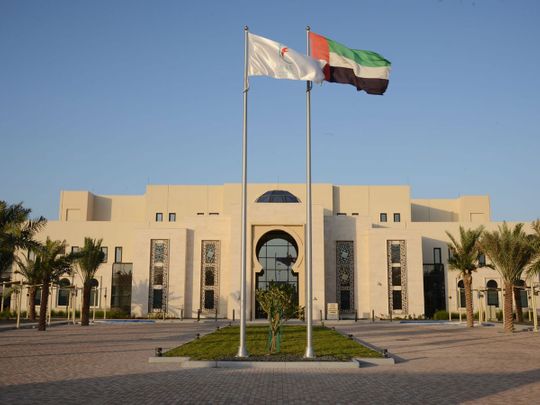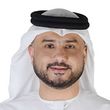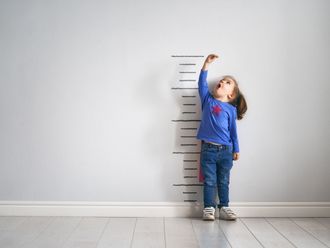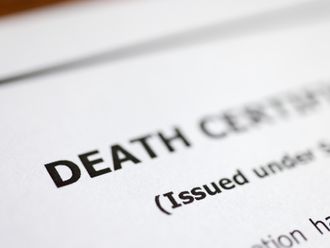
Abu Dhabi: Ahead of the International Day Against Drug Abuse and Illicit Trafficking (June 26) - also known as World Drug Day - a host of new support services and treatments for patients suffering from addiction have been announced in the UAE.
For the first time, patients will be able to remotely communicate with medical teams, who will follow up on their condition and provide immediate medical advice, a senior official told Gulf News.
In an interview, Dr Saif Ahmed Darwish, Principal Health Education Specialist, National Rehabilitation Centre (NRC), said: “Work is currently underway to develop a new programme for the first time, which will be used to remotely monitor and follow-up addiction patients. This programme will enable the medical team to communicate with the patient, follow up on their vital signs while they are at home, and provide immediate medical advice.”
NRC, he added, has also established support groups using visual communication technology and provide technical resources for patients and their families remotely.
Specialised clinic
Additionally, the centre is working on creating a number of treatment programmes such as a specialised clinic for teenagers, known as the Adolescent Outpatient Programme, for young people between 15 and 18 years old who suffer from substance use disorder (SUD). The programme will conduct a comprehensive multidisciplinary assessment that fits young patients’ needs through evidence-based medical and psychological interventions, Dr Darwish said.
The National Rehabilitation Centre in Abu Dhabi marks the annual occasion by announcing a campaign to protect the community and develop new plans to combat the spread of drugs, especially among youth and adolescents, and provide the best treatment methods for addicts. Dr Darwish said this year’s campaign slogan is ‘We end the stigma and strengthen prevention’.
Achievements
Speaking about NRC’s achievements during the first quarter of this year, compared to last year, Dr Darwish mentioned:
• Increasing the capacity of the Centre from 78 beds to 90 beds by the end of 2022, and to 114 beds by the end of the first quarter of 2023.
• Improving and developing the channels for requesting the centre’s services through the official TAMM app, the website, and call centre.
• Increasing the number of outpatient clinics with the aim of accommodating the largest number of patients and reducing waiting lists, as the clinics are considered the main pathway for inpatients and the processes of evaluating patients’ cases are carried out in order to recommend the appropriate treatment plan.
New facilities
Dr Darwish also pointed out that the new NRC building is establishing a specialised gym for patients, in cooperation with Abu Dhabi Sports Council, that contributes to their rehabilitation process for patients. They can continue to use the gym even after they have left the centre.
Moreover, NRC is building a facility for visitors to maintain the confidentiality of patients and give them more privacy during entry and exit from the centre, at the same time providing a suitable space for family visits.
Shorter wait
Dr Darwish said the target is to limit the number of waiting days for an appointment to a maximum of 14 days.
“Some patients’ condition does not require admission for treatment in the inpatient departments of the centre, or their circumstances do not allow them to be admitted, such as studies or the nature of their work. On the other hand, patients who are admitted for treatment in inpatient departments will need follow-up in outpatient clinics to complete treatment programmes after they are discharged from inpatient departments,” he added.
Enduring partnerships
“In order to achieve its ambitious vision of the leadership and excellence, the National Rehabilitation Centre has sought to establish local and international partnerships that contribute to the development of its services for patients, their families, and the centre’s employees.”
Dr Darwish mentioned examples of some local partners as Abu Dhabi Police General Command, Dubai Police and the Drug Control Department, who all cooperate to monitor the risk of addiction in the country, in addition to coordination in the fields of raising public awareness and examining ways to curb the risk of addiction through collaboration in reviewing drug laws.
“There is also cooperation with the Department of Community Development regarding the implementation of the Abu Dhabi’s SUD Management Strategy, and establishing a holistic model for social re-integration to support recovering SUD individual through cooperation in projects and research aimed at identifying the needs of the patient’s family,” he added.
“In order to build a structured patient referral process across the model of care and establish integrated treatment models for different groups, the centre has established partnerships with health institutions in the country [such as] the Ministry of Health and Department of Health - Abu Dhabi in order to increase cooperation in the fields of therapeutic and pharmacological treatment and research related to addiction.
“On a related level, there is close cooperation with the most prestigious educational institutions in the country, such as the United Arab Emirates University, Zayed University, and Abu Dhabi University. The goal of cooperation is in the field of training and scientific research, by contributing to the preparation of studies and research related to addiction.”
On an international level, NRC has, Dr Darwish added, established a partnership with the Colombo Plan with the aim of strengthening the position and role of the centre as a regional and global centre of excellence in all areas related to training programmes, prevention and early detection, dissemination of educational information via the internet and social networking sites, and organising awareness activities such as lectures in educational and professional councils and institutions, as well as virtual educational seminars for the public.
‘Unprecedented achievement’
About the cooperation with World Health Organisation (WHO), Dr Darwish said: “The National Rehabilitation Centre is the first regional institution to obtain the status of a ‘collaborating centre with the World Health Organisation’, which qualifies it to be a reference in the field of addiction sciences and its research, treatment, and rehabilitation branches at the regional level.”
Recently, the centre achieved an “unprecedented” achievement for the Middle East region by obtaining an accredited certificate from the United Nations Office on Drugs and Crime in Vienna for the second time in a row, after fulfilling the requirements for participation in the quality programme for drug, narcotics, and poison laboratories.
Today, the National Rehabilitation Center is present in many committees and projects related to addiction and drugs at the local and global levels, and we have a real influence in leading global trends in this regard.











